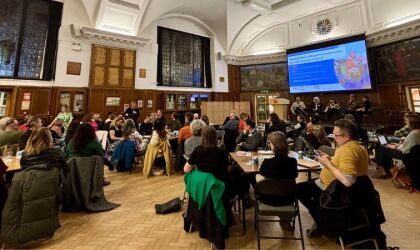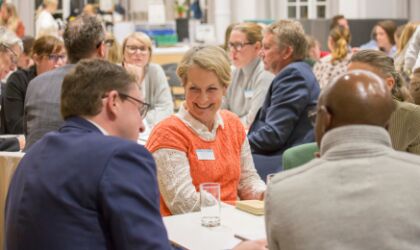
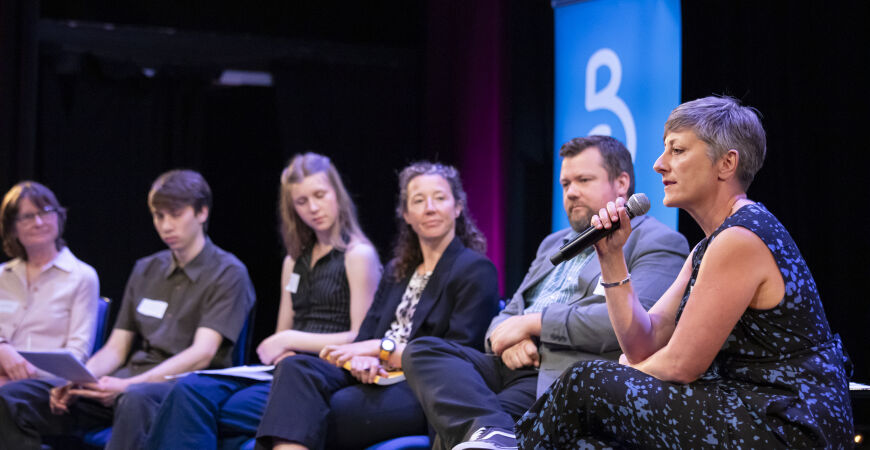
Thu 26 / 06 / 25
The Big Debate: Is Brighton ready for devolution's big opportunity?
Devolution is the new buzzword of the moment, with Sussex and Brighton identified as an area for priority devolution with the transfer of powers from national to local government. Kerry Watkins, MD of Social for Good writes after our latest Big Debate exploring what devolution could mean for the city, our businesses and economic outlook. With thanks to our event sponsor, Silverstone Communications.
By Kerry Watkins of Social For Good
On a warm June evening, 150 or so of us from Brighton and Sussex’s business and civic communities gathered at The Old Market for Brighton Chamber’s Big Debate (the biggest yet!) - ‘The Devolution Debate: Brighton’s breakaway moment?’, which set out to explore what devolution might mean for our city and region.
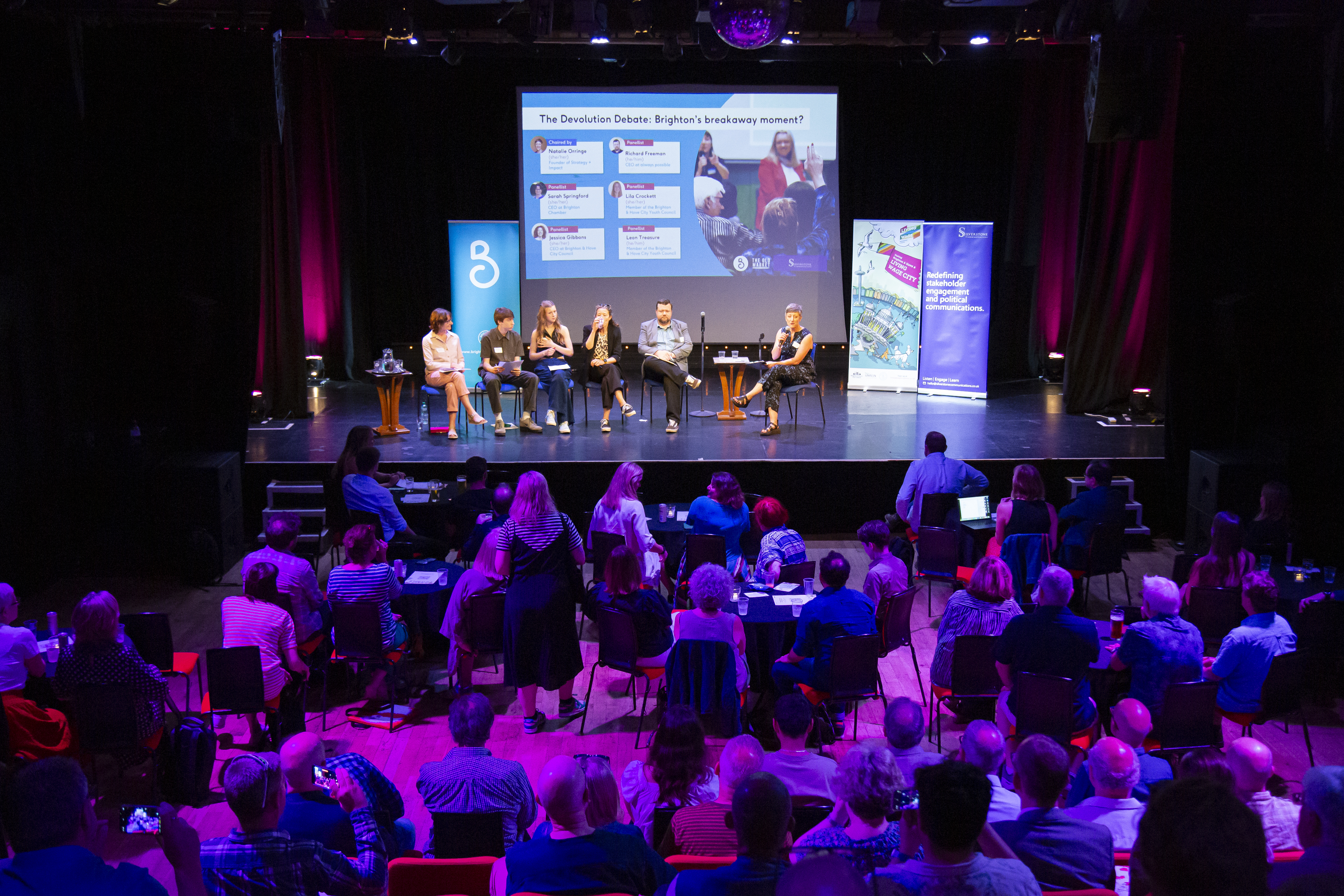
But not before we’d all had a crash course in what devolution actually means. If you’re sitting (somewhat uncomfortably) in the “I kind of get it but feel like I should know more” camp and you didn’t make it to the debate - keep reading.
Now, if you’re already glazing over at the word devolution, you’re not alone. As Chair Natalie Orringe wryly observed, it’s a topic that’s “killed many a dinner party conversation”.
But I promise you - it’s more exciting than it sounds.
On this night, the air in the Old Market was crackling with possibility and with questions. Could devolution help us shape a better future for Brighton and Sussex? And if so, how do we make sure it works for everyone?
What is devolution - and why now?
Put simply, devolution means shifting some decision-making powers - and some funding - from Westminster to our own backyard. It’s about giving places like Sussex more say over how things like housing, transport, skills, and climate policy are shaped and delivered.
It doesn’t mean a blank cheque or complete independence, but it does mean more local control over decisions that affect everyday life here. Think of how Scotland, Wales, and Northern Ireland have their own governments, or how Greater Manchester has used devolution to take charge of long-term planning, including for health and social care.
In our case, it’s not just Brighton going it alone - devolution is being explored across Brighton & Hove, East Sussex, and West Sussex as a whole. Together, we’re big enough to form what’s called a combined authority, led by a directly elected mayor.
So Brighton and Sussex are now on the government’s fast-track list. If the deal goes ahead, we could have a Sussex mayor by May 2026. That’s not a lot of time to figure out what this could mean, how it might work, and how we make sure it reflects what we want for our region.
The voices that powered this debate
One of the things that made this Big Debate different? The panel.
Here’s who we heard from:
Richard Freeman (CEO of always possible) brought both passion and pragmatism, calling devolution a chance for Sussex to “think bigger” and plan beyond short-term political cycles. A self-confessed “obsessed with devolution” voice, he reminded us that it’s not just about structures - it’s about creating the conditions for long-term wellbeing. His call for a “grown-up conversation with ourselves and the rest of the region about how everyone can benefit from better investment and greater scale of thinking” set the tone for the evening.
Jess Gibbons (Chief Executive, Brighton & Hove City Council) gave a compelling insight into the realities on the ground. She described a city under strain - a “pressure cooker of a system” with more people in temporary accommodation, rising mental health challenges, and the effects of “10 years of austerity”. But she also framed devolution as a way to move beyond firefighting: a way to unlock longer-term strategies for housing, community safety, transport, and services that connect people to opportunity. She emphasised the need for genuine collaboration: “Together, we are far greater than the sum of our parts.”
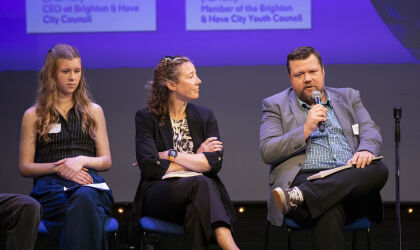

Lila Crockett’s (Brighton & Hove Youth Council) voice stood out for its clarity and challenge. She highlighted how young people often don’t know how local government works, let alone what devolution means. Her message was simple: if we want devolution to work for future generations, we need to engage young people meaningfully from the start, not as an afterthought.
Leon Treasure (Brighton & Hove Youth Council) shone a light on the challenges facing young people transitioning into work. He argued that devo could be “the antidote” to the draw of London - helping create stronger local career opportunities that keep young people in Sussex. He also championed extending the vote to 16- and 17-year-olds, so young people can have real political capital and hold leaders accountable.
Sarah Springford (CEO, Brighton Chamber) reflected the business community’s mix of hope and confusion. She shared that many members felt devo “should be on my radar but I don’t really understand what it’s about”, highlighting the need for much clearer communication. But she also outlined where businesses see opportunity - in better skills planning, more joined-up procurement, and a regional approach that helps them stay, grow, and contribute to a stronger local economy.
What people in the room want from the new mayor
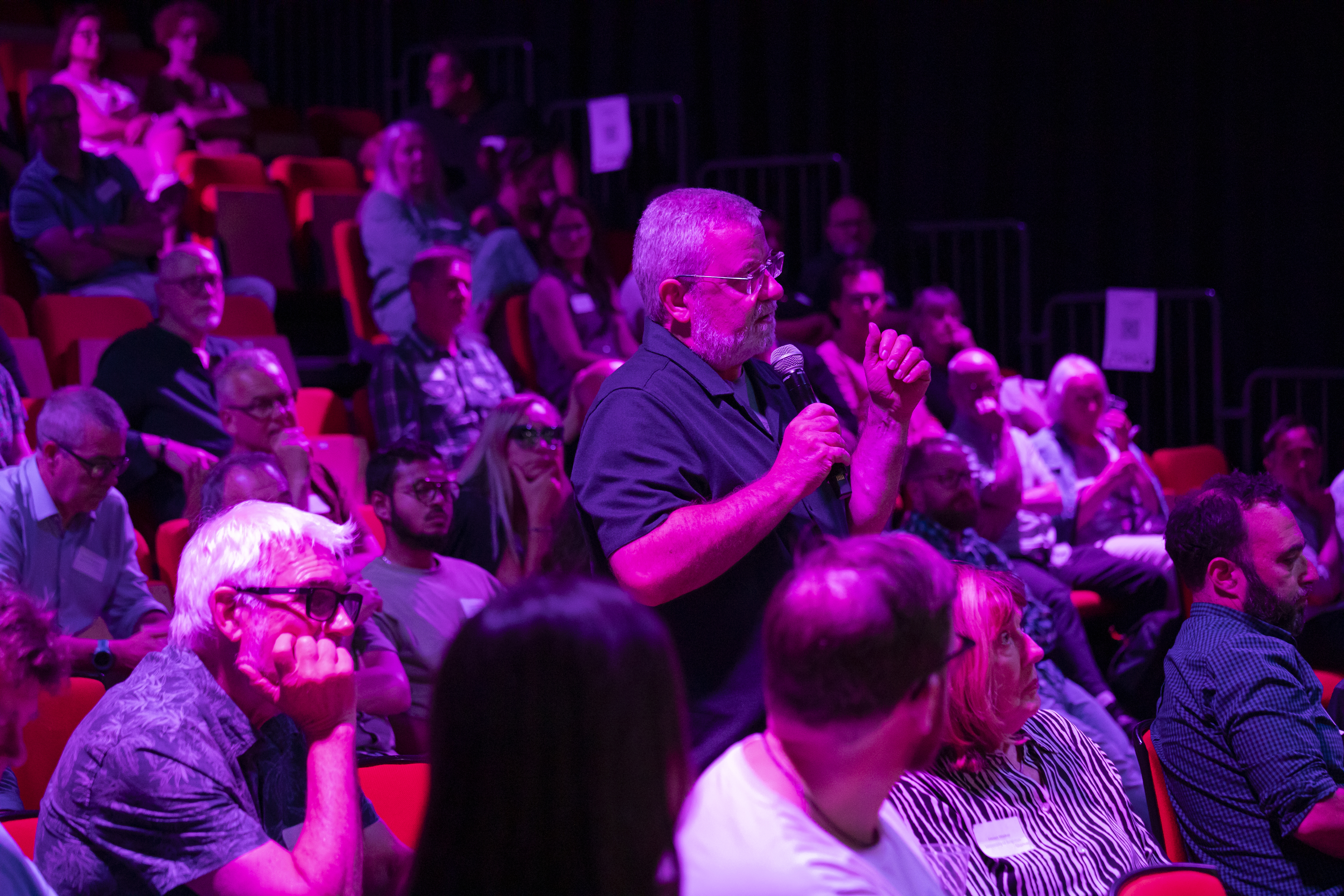
When the floor had its say, the energy and ideas that came through reflected many of the same hopes and concerns that we’d heard from the panel. People shared what they felt the new mayor must focus on if devolution is going to make a difference:
🏠 Affordable housing
Calls for more social housing, action on homelessness, and creative approaches that blend new builds with retrofits surfaced. Housing wasn’t just seen as a policy issue - it was seen as the foundation for tackling inequality and creating communities where people can thrive.
💼 Skills, jobs, and opportunity
Many called for stronger links between business and education, better pathways into work for young people, and support for evolving workplace skills - especially as AI reshapes the job market. There was a real appetite to see Sussex create opportunities that match its talent.
🚍 Transport that connects us
Transport infrastructure came up again and again - with people wanting more affordable, joined-up, and sustainable connections across the region, not just in and out of London. And yes, that much-loved shout for “a cycle lane from Hove to Shoreham” made the list too.
🌱 Climate, nature, and sustainability
Attendees wanted climate resilience and nature recovery to be baked into the region’s plans, not treated as an optional extra. There was a call to learn from models like Wales’ Wellbeing of Future Generations Act and think long-term about what kind of region we’re building.
🤝 Collaboration and clear communication
From avoiding top-down decision making to involving under-represented voices, people called for politics that feels open and inclusive. And they weren’t shy about saying comms so far has been “appalling” - clear, honest communication has to be a priority going forward.
What kind of leadership do we need?
So, what kind of mayor should we be looking for?
Someone with a clear vision for Sussex - able to see complexity as a strength, not a barrier. Someone who listens, collaborates, and helps shape a region that works for all of us.
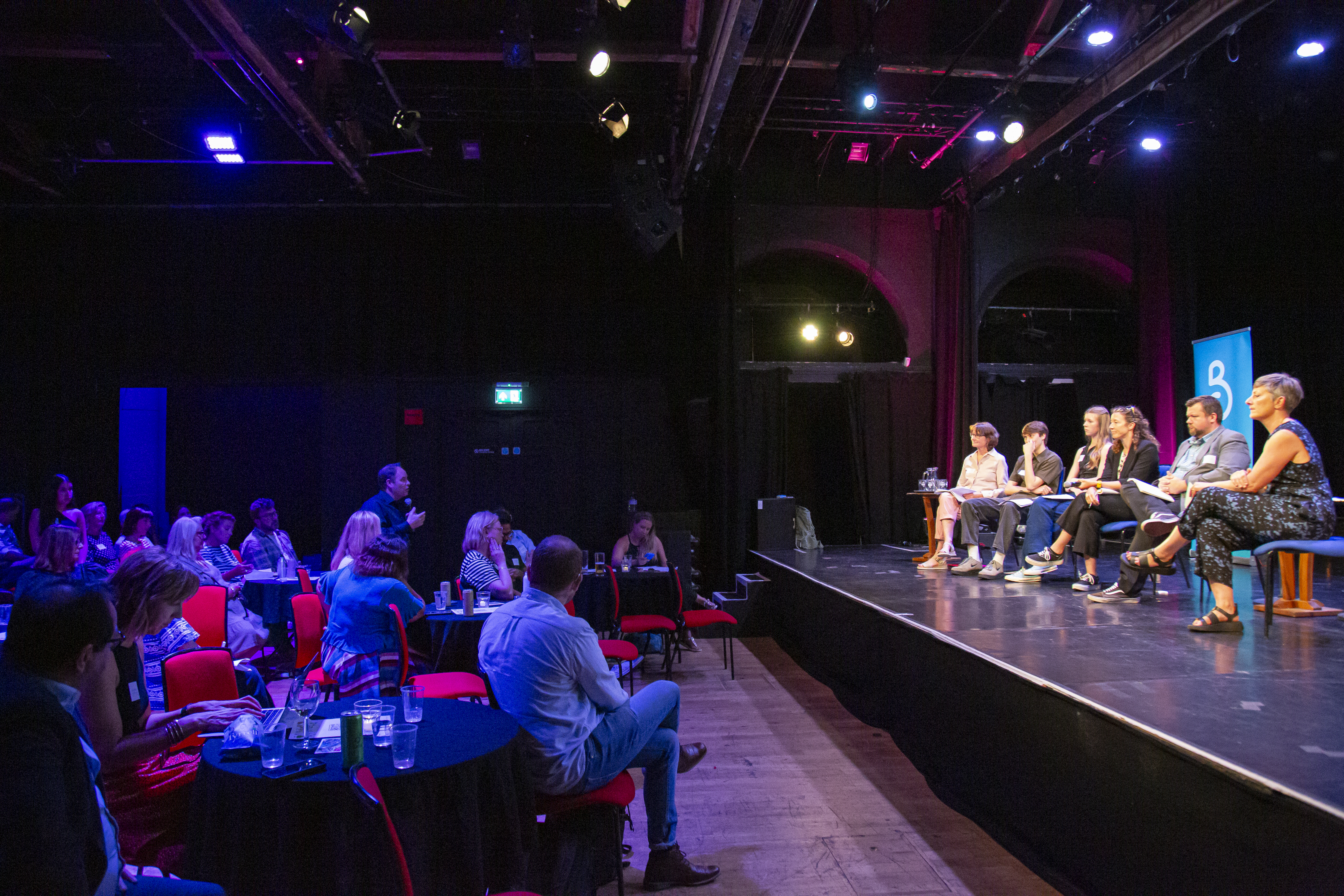
Jess Gibbons talked about the need to build “institutions that stand the test of time.” Lila Crockett reminded us what’s at stake if we don’t get it right: “No one knows it exists or how it works!” she said of local government — a line that got more than a few nods. We need leadership that brings everyone in, not just the usual suspects.
And just quietly, when Chair Natalie Orringe referred to the future mayor as she, it was said so naturally, it barely registered. Except, of course, it did.
Then came Richard Freeman’s down-to-earth reminder: no matter how visionary a leader is, they still need to win trust on the basics. “Bins and schools!” he joked - but it landed for a reason. Leadership needs to be ambitious and grounded.
Where do we go from here?
The Big Debate made one thing clear: devolution could be one of the biggest opportunities we’ve had in a generation - but only if it’s shaped with Sussex’s people, not done to us, as Richard Freeman reminded us.
There were big hopes in the room:
👉 A stronger regional identity - “let’s be loud and proud about Sussex and Brighton”
👉 A chance to tackle housing, transport and skills in a joined-up, long-term way
👉 A move away from reactive, short-term politics to something more strategic and collaborative
But also big fears:
👉 That this becomes a “Brighton land grab” rather than a Sussex-wide plan
👉 That it adds more layers of bureaucracy
👉 That decisions will be made by a small group, disconnected from the people they affect
Throughout the evening, the need for collaboration came through loud and clear. “There’s no limit on what communities can do - the success will be in how this is led and managed,” said one attendee.
And that’s the crux of it. What happens next will depend on how well we bring people in, how honestly we communicate, and how bravely we lead.
So let’s keep the conversation going. Let’s ask questions, stay curious, and make sure this opportunity reflects the region we want to be, not just now, but for the long run.
Still think devolution’s boring? Spend 10 minutes chatting to Geri Silverstone (event sponsor and self-confessed devo anorak) and I dare you not to come out just a little bit more excited.
Kerry Watkins is Managing Director at Social for Good - a big thank you to Kerry for a brilliant writeup of this very big debate.
A big thank you also to:
- Our event sponsor, Silverstone Communications
- Beth Wild for event photography
- Natalie, our panel chair, and our expert panel
- The Old Market for hosting us
Lively, topical and challenging, the Big Debate looks at topics that are important to businesses right now in our city. Catch up on previous Big Debates here.
Devolution is a big topic for Brighton and Sussex, and the Chamber is working with partners and businesses locally to help you understand what it could mean for your business over the coming months. Sign up to our mailing list to stay up to date.
If you want to contribute to the Chamber blog, contact us on hannah@brightonchamber.co.uk



